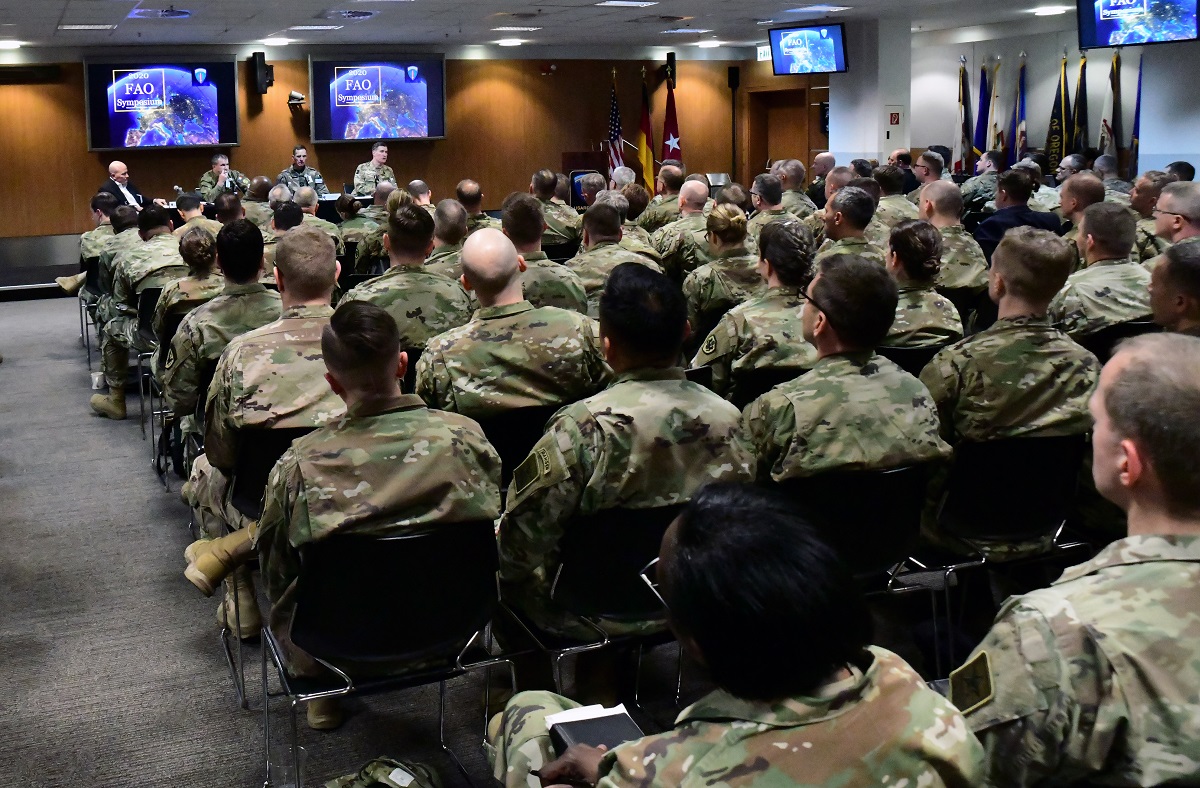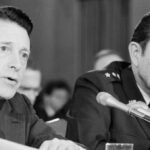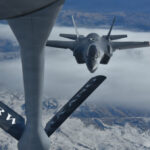
U.S. Army Europe hosted approximately 170 U.S. Army Foreign Area Officers and distinguished visitors for the inaugural European FAO Symposium, January 2020, Wiesbaden, Germany. (Robert Sekula, U.S. Army Europe and Africa)
Today’s geopolitical landscape is fraught with tensions stemming from divergent interests, incompatible ideologies, and a re-emphasis on inter-state competition for power and influence.
Russia’s renewed invasion of Ukraine has entered an attritional phase, in which both the West and Russia have begun re-tooling in earnest for protracted conflict. Russia’s reconstitution of its armed forces is supported by a host of illiberal regimes, including the People’s Republic of China (PRC), Iran, and North Korea. PRC military exercises near Taiwan and coercive activities against the Philippines worry regional leaders about Beijing’s capabilities and intentions. Great power security relationships with African countries, particularly in the Sahel, are in dramatic flux.
Today’s geopolitical landscape is fraught with tensions stemming from divergent interests, incompatible ideologies, and a re-emphasis on inter-state competition for power and influence. While economic, environmental, and technological challenges are significant, security issues dominate foreign policy and global affairs. In this strategic environment, statesmen, diplomats, and military leaders leverage relationships to reduce instability and posture their countries for strategic advantage. They conduct traditional diplomacy via bilateral and multilateral negotiations that seek peaceful settlements according to their interests, conduct intelligence diplomacy to spur collective action and prepare for defense, and military diplomacy to keep partners and allies in the fight.
Diplomacy is the established method of influencing the decisions and behaviors of foreign governments and people through dialogue, negotiation, and other measures short of war or violence. States conduct diplomacy in a variety of ways in the pursuit of national interests. States employ official representatives to conduct diplomacy, primarily from their foreign ministries but also from other departments and agencies. Given that many bilateral and multilateral issues deal with defense or security issues, military officials are inevitably involved in diplomacy well before they employ their forces in combat. Armed forces employ various non-violent actions to influence the decisions and behaviors of foreign governments, non-state actors and populations in pursuit of national objectives. When directed externally, these actions constitute military diplomacy and can be significant, regardless of whether military officials or organizations subscribe to their role in such affairs. Such activities include dialogue (key military leader engagements), negotiations over conflict termination or other security issues, defense and security cooperation, demonstrations of force, and benevolent missions like civil affairs or humanitarian assistance and disaster relief. These activities communicate or signal to external audiences. Any non-violent military action that intends to influence foreign decisions and behaviors is military diplomacy.
With such a broad definition, the concept of military diplomacy overlaps with other related approaches to military action. Some military diplomacy activities fit within the rubric of irregular warfare, which the U.S. Department of Defense now defines as “a form of warfare where states and non-state actors campaign to assure or coerce states or other groups through indirect, non-attributable, or asymmetric activities, either as the primary approach or in concert with conventional warfare.” Many of the operations of irregular warfare, if conducted without employing violence, fit within the context of military diplomacy. Other missions of irregular warfare do not, such as unconventional warfare, counterterrorism, and counterinsurgency. Similarly, military campaigns to compete below the level of armed conflict incorporate many elements of military diplomacy. In reality, every aspect of such a campaign is essentially military diplomacy.
In the age of strategic competition where the stakes are high as powerful nations jockey for advantage, both military leaders and statesmen will do well to understand the benefits and risks of the array of diplomatic levers at their disposal. Effective military diplomacy can prove decisive, but unsuccessful military diplomacy can prove counterproductive to overall foreign policy goals. Militaries generally do not manage the foreign affairs of states. Militaries contribute to the overall diplomatic strategy through their participation in the national security decision-making process. This article does not advocate militarizing foreign affairs; rather, it promotes recognition of the significant contributions that defense agencies have always made to foreign policy. Discounting the role of defense agencies in foreign policy disregards available and effective tools available to the national security apparatus to pursue national interests. Alternatively, an overreliance on the military as a tool in foreign affairs is equally fraught. Balance is key, and planned integration among ministries and departments is essential.
During the 2023-2024 U.S. Army War College academic year the authors, both students in the Carlisle Scholars Program, conducted two research projects on military diplomacy. Using examples from across time, from the Peloponnesian War up to contemporary events, the project of one author (Wise) examines the scope of military diplomacy, with an analysis of markers of effectiveness and lessons learned for security practitioners. The author is developing a manuscript with the aim of publishing a book with the working title With Sword in Sheath: The Evolution and Significance of Military Diplomacy. He observes that military officials at all echelons may conduct military diplomacy, but senior military leaders are the most prominent players in holding impactful dialogue, negotiating with authority, and making decisions on other non-violent measures to influence other governments’ decisions and behavior. The U.S. military enterprise develops and employs a cadre of foreign area officers (FAOs) to advise senior leaders, develop plans and policy, and, in some positions, personally conduct military diplomacy. These military foreign affairs experts do not own the market on military diplomacy, but the best strategic leaders will leverage these experts to their fullest potential.
FAOs provide critical information to DoD and army senior leaders on host nation security issues and provide critical warning and situational updates on emerging crises.
U.S. Army FAOs serve at the forefront of geo-strategic competition, with more than 350 officers assigned to embassies and consulates around the world. In many locations, these FAOs are the only representatives of the Department of Defense with host nation governments. They are responsible for vital missions and provide the foundation for strategic competition with near-peer states. FAOs conduct bilateral and multilateral military negotiations, including crisis management. These FAOs facilitate basing, access, and overflight for ongoing or planned U.S. operations. FAOs provide critical information to DoD and army senior leaders on host nation security issues and provide critical warning and situational updates on emerging crises. FAOs facilitate and enable security cooperation activities, including bilateral and multilateral training exercises, foreign military sales, and foreign military financing.
In the Chief of Staff of the Army’s (CSA) Paper #1: Multi-Domain Transformation: Ready to Win in Competition and Conflict, former CSA James McConville highlighted the army’s role in strategic competition when he described how ground force posture and capabilities “create opportunities and provide options” to both policymakers and the joint force to deter and if necessary, prevail against adversarial states. McConville identified the Global Landpower Network as foundational to the army’s ability to retain and improve positional advantage, with the United States’ alliances and partnerships as the crucial connective tissue. CSA Paper #2: The Army in Military Competition, explicitly provides a definition of military competition that encompasses “a range of activities and operations employed to achieve political objectives and deny adversaries the ability to achieve objectives prejudicial to the United States.” CSA Paper #2 describes three dynamics of competition: narrative, direct, and indirect competition. CSA Paper #2 explicitly identifies the FAOs role in strategic competition in “Appendix A: Army Activities and Effect in Military Competition,” when it assigns four tasks to FAOs/Country Teams. An additional sixteen tasks can be inferred as partially the responsibility of FAOs on country teams or assignments to theater armies, the Pentagon, or the intelligence community.
The other author’s (Ping) project was conducted at the behest of U.S. Army proponent for FAOs. That project examined FAO’s role in strategic competition, with a specific examination of the requisite authorities, roles, billeting, and rank structure of senior defense officials (SDOs) at embassies and consulates worldwide. This study included a survey of the FAO community that received feedback from 41 FAOs in assignments in combatant commands, army service component commands, and embassies and consulates. The results indicated that army FAOs broadly believed that they had the necessary tools and authorities to engage in strategic competition. However, slow delivery of foreign military sales cases due to challenges within the U.S. defense industrial base undercut U.S. messaging aimed at being the security provider of choice. Respondents also expressed frustration with the amount of bureaucratic overhead that impeded mission accomplishment. Military diplomacy is a vital component of foreign policy. As the Department of Defense returns to thinking about strategic competition, there should be a concomitant focus on how military diplomatic actions can either advance or hinder foreign policy objectives. Foreign area officers serve at the forefront of strategic competition through their regional expertise and their roles in embassies and defense policy making bodies at military headquarters. Synchronized campaigning and proper resourcing can help the joint force advance U.S. interests and maximize U.S. influence with allies and partners in an increasingly contested strategic environment.
Derek Ping is a colonel and a Foreign Area Officer in the United States Army. He is the Deputy Director, Operational Support and International Partnerships Indo Pacific Team Office of the Secretary Defense (I&S). COL Ping is a graduate of the AY24 Resident Course at the U.S. Army War College and a member of the Carlisle Scholars Program.
Michael Wise is a colonel and a Foreign Area Officer in the United States Army. He is the Army Attaché in the U.S. Embassy in Moscow, Russia. COL Wise is a graduate of the AY24 Resident Course at the U.S. Army War College and a member of the Carlisle Scholars Program.
The views expressed in this article are those of the author and do not necessarily reflect those of the U.S. Army War College, the U.S. Army, or the Department of Defense.
Photo Description: U.S. Army Europe hosted approximately 170 U.S. Army Foreign Area Officers and distinguished visitors for the inaugural European FAO Symposium, January 2020, Wiesbaden, Germany.
Photo Credit: Robert Sekula, U.S. Army Europe and Africa





In 1963, this book was published.
The Ugly American by William J. Lederer and Eugene Burdick
This article describes the process for engaging in diplomacy. It never discusses, while no matter how smooth you talk, some objectives are unobtainable.
Someone should have raised their hand when the objective was to make Afghanistan modern democracy. When many Muslims want a return to a caliphate like under the four good caliphs.
This article never explains how our armed forces will get the cultural knowledge and the understanding of the actors in a foreign country when the US Department of State employees will not go out of the Green Zone. It might be the case that AID employees should be the ones called back to Washington, DC to explain what is going in a particular country.
In my opinion, diplomacy is useless unless you understand the circumstances of a country. This is in line with what Sun Tzu said about war.
I’m so grateful for your guidance and patience. You’ve been amazing.